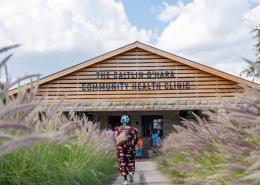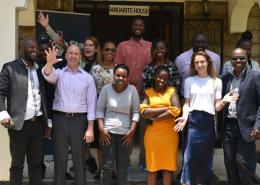This Rotational R&D Program Allows Young Scientists to Experiment in Their Careers

Young scientists face some tough decisions when they graduate from college. Will they use their degree to enter a science-related field? Go to grad school? Forge a new path entirely?
At Pfizer, a two-year program allows a handful of recent graduates to “try out” different jobs across the drug development process and learn more about career choices — and themselves. Associates accepted to the R&D Rotational Program immerse themselves in four rotations of their choosing for six months each. “I see it as an opportunity to figure out what you like and, more importantly, what you don’t like, because you get to try four completely different jobs,” says Mercedes Gyuricza, PhD, who is the program lead. Gyuricza emphasizes that participants are learning and contributing important work throughout the program, while getting paid. "They're not doing just busy work. They're not doing just shadowing, they're not interns," she says. "They're doing actual projects that benefit Pfizer."
The idea for the program arose in 2020. Since then, three classes with a total of 36 associates have joined the highly competitive program, which accepts applications each fall. Last year, 700 people applied for 12 positions.
Gyuricza says she loves watching the participants transform over the course of the program. Often, they arrive at Pfizer a little bit quiet and a little bit green, she says, but as their curiosity kicks in they begin to make the most of the opportunities before them. “It’s a lot of drinking from the firehose at first. Then they get their bearings and they’re productive,” she says. Their rotations have included everything from drug discovery to regulatory filings and submissions; with some associates presenting at conferences and publishing their work in reputable journals as well.
For Pfizer, the benefits go both ways. While the company makes no commitment to hiring the associates at the end of the program, that remains the long-term goal, says Gyuricza. And in the short term, Pfizer colleagues get to work with the next generation of scientists, teaching — and learning — as they go. “When you have new talent, it brings a new perspective and innovation,” says Gyuricza. “And they’re really hard workers.”
Below are profiles of three of those young scientists who found purpose and direction through the R&D Rotational Program — in fact, one now has a go-forward role at Pfizer.
When Gyuricza considers what’s ahead for each of them, she envisions the whole world. “They all have big dreams,” she says, “and I know they will achieve them all.”
Fulfilling a purpose
In the first four years of his life, Paul Sheriff experienced violence and loss too deep for a person of any age to comprehend, much less a child. This was in Sierra Leone, a country in West Africa ravaged by civil war. After losing his father in the conflict, Sheriff and his mother immigrated to the United States as refugees, settling in Tampa, Florida. Growing up, Sheriff recalls how his mom would repeat one piece of advice: “Paul, always focus on your education. Because life can take away everything from you, but no one can ever take away your education.”
Those words followed him to college at the University of South Florida, where he majored in biomedical sciences and minored in political science, with dreams of becoming a physician. They were also on his mind when he applied for the Pfizer R&D Rotational Program in 2021, eager to learn more about advancing health equity. “I’m all about meaningfully improving the country that gave me a second chance at life,” says Sheriff. “And you do that by addressing disparities in education and healthcare.”
During his rotations, Sheriff worked with a team dedicated to increasing vaccination rates in underserved communities and improving health literacy; he studied innovations in wearable technology and even co-authored three papers on the topic, which were published in Nature (check one of the papers out here); and he learned how to use generative artificial intelligence to accelerate workflow processes.
Beyond immersing himself in the science, Sheriff has taken every opportunity to meet with Pfizer colleagues and ask for advice. During his first six months at the company, he met his personal goal of meeting with over 100 people. He’s since met with countless others, including an ambassador from Sierra Leone, who visited the Pfizer Innovation Research (PfIRe) Laboratory. “I was so nervous, but I gathered the confidence to say to the ambassador, ‘Your excellency, I was actually born in Sierra Leone, and I think it’s an absolute honor to meet you,’” says Sheriff.
As the program comes to a close for Sheriff, he has his eyes on what’s next. In the summer, he’ll begin medical school at Howard University. After that? He’s not sure. But he knows he’s guided by a mission to live up to his full potential. Because he knows too many others in his home country never had that chance.
“If you give me the smallest opportunity, I make the most of it, because I didn’t have those opportunities growing up,” says Sheriff. “And I see how valuable they are.”
Discovering new opportunities
When Madison Snyder graduated from Swarthmore College with a degree in biology and Spanish in 2021, she was feeling stymied by her career options. She figured she could go to graduate school and become a professor or start a career full time in a lab. She struggled to see herself in either of those roles.
Fast forward to 2024. Snyder is wrapping up her second year of Pfizer’s R&D Rotational Program, and her head is spinning at the career options and possibilities that lie ahead. “I think one of the benefits of working at such a big company is there are so many people doing so many different things,” says Snyder. “The job titles I’ve come across, I never even knew they existed. And people were so open to having a chat with me about their career path.”
Through her rotations, Snyder has worked at the bench in early drug discovery research; she’s learned to evaluate and quantitatively model drug performance using statistics (called “pharmacometrics”); she’s used genetic and genomic approaches to study drug resistance in prostate cancer; and she’s had a front-row seat to the regulatory and approval process for what is now Pfizer’s first FDA-approved gene therapy. Along the way, she had the honor of presenting findings from her clinical pharmacology rotation at a pharmacometrics conference. “It was a little intimidating given how new I was to pharmacometrics,” she recalls, “but it went really well.” In addition, Snyder received the Statistics x Pharmacometrics Trainee Abstract Award and had the opportunity to give another presentation during the conference.
In fact, Snyder says she was so inspired by the colleagues she’s spoken with that she decided to follow in their footsteps and pursue her PhD. In the fall, she’ll start a PhD program in Pathobiology and Mechanisms of Disease at Columbia University, which examines the basic science, clinical, and social implications of different diseases. One day, she hopes to use her expertise in science and research to make strategic decisions about what projects will have the most impact on patients, and maybe even become a chief scientific officer.
Her experience at Pfizer has helped Snyder to see the big picture and the endless possibilities in science, and that, she says, has been life changing. “It’s shifted my perspective of what you can do in the biology space to still be supporting the science,” she says, “and not necessarily being the person doing the experiments or the treating physician or the professor teaching about it.”
Launching a career
From an early age, Arun Balaji knew he wanted to help people. Growing up, he watched his grandmother endure a series of surgeries after a bad accident, and he saw his grandfather struggle with cancer. At Drexel University, Balaji decided to study biomedical engineering, earning a bachelor’s and a master’s degree, while minoring in business. “I was interested in seeing how I can help improve the quality of life for people around the world,” says Balaji.
As a part of his Drexel education, Balaji got hands-on experience working at Pfizer for six months. He loved the culture there so much that he didn’t hesitate to apply for the R&D Rotational Program when it launched in 2021.
Throughout the program, he immersed himself in areas that were outside his comfort zone and kept an open mind. During his rotations, he learned about clinical trial strategies, including what activities are best done internally and what should be outsourced; he joined a group of science scouts looking for exciting discoveries around the world; he built surveys asking patients questions about their experiences and goals with different conditions and medications; and he learned how to strategically work with regulatory health authorities in pursuit of new product approvals.
To Balaji’s surprise, he enjoyed that last rotation so much he applied for a job that would allow him to continue that work. Since 2023, he’s been working as a regulatory strategist within Pfizer’s oncology group.
When Balaji reflects on his favorite aspects of the rotational program, his mind goes to the less-tangible takeaways: there’s the confidence from encountering so many new people and processes every six months; there’s the enduring friendships from his small cohort; and there’s the pride he feels about working at a place like Pfizer, especially as a young scientist.
Looking to the future, Balaji believes that this program will benefit Pfizer and patients. By building a pipeline of talent, the company gleans fresh perspectives that fuel innovation throughout the company.
“I think innovation comes from diversity of thought and diversity of experiences. So bringing people into the company that come from all walks of life is really exceptional. It helps our science,” says Balaji. “At the end of the day, we’re serving patients from all across the world that have different backgrounds. I think it’s important that our workforce reflects the patients we serve.”
Recruitment for the Pfizer R&D Rotational program begins in the fall. To learn more about the program, requirements, and how to enroll, visit https://www.pfizer.com/en/about/careers/pfizer-rd-rotational-program.





